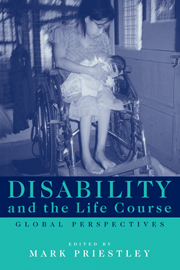Book contents
- Frontmatter
- Contents
- List of figures
- List of tables
- Notes on contributors
- Preface
- Acknowledgements
- A brief note on terminology
- I Concepts
- 1 Introduction: the global context of disability
- 2 Repositioning disability and the life course: a social claiming perspective
- 3 Marginalisation and disability: experiences from the Third World
- 4 Where do we draw the line?: surviving eugenics in a technological world
- 5 A complicated struggle: disability, survival and social change in the majority world
- II Methods and stories
- III The politics of transition
- Index
4 - Where do we draw the line?: surviving eugenics in a technological world
Published online by Cambridge University Press: 30 September 2009
- Frontmatter
- Contents
- List of figures
- List of tables
- Notes on contributors
- Preface
- Acknowledgements
- A brief note on terminology
- I Concepts
- 1 Introduction: the global context of disability
- 2 Repositioning disability and the life course: a social claiming perspective
- 3 Marginalisation and disability: experiences from the Third World
- 4 Where do we draw the line?: surviving eugenics in a technological world
- 5 A complicated struggle: disability, survival and social change in the majority world
- II Methods and stories
- III The politics of transition
- Index
Summary
Throughout history, science and technology have had a profound impact on disabled people's lives, both positive and negative. Prevailing ideology contends that science and technology are value neutral, and that the only problems caused by technologies are either unintended side effects or abuses. In this chapter, I will dispute both these claims. Advances in science and technology are the results of human intervention, imbued with intention and embodying the perspectives, purposes and particular objectives of powerful social groups. Current technologies do not benefit all segments of society equally, and are not meant to do so. To maximise public support for technological developments, and to minimise opposition, technology proponents rarely acknowledge the distributional inequities and ramifications of their proposals.
Technologies are not neutral; they are social and political phenomena, and the field of bio/gene technology research is no different. It has the potential to alter society fundamentally, to divide us into two classes: those whose characteristics are in tune with expectations and those viewed as undesirable. Whenever it is detected that a human being is not measuring up to societal expectations, whether prior to birth or after, the ‘offending’ person will have his or her right to exist put at risk. Different characteristics will be targeted, depending on the cultural, political, philosophical, economical and spiritual background of any given society.
- Type
- Chapter
- Information
- Disability and the Life CourseGlobal Perspectives, pp. 38 - 49Publisher: Cambridge University PressPrint publication year: 2001
- 7
- Cited by



